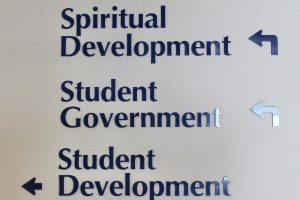WRITTEN BY: Samantha Watkins, Nicholas Kjeldgaard, and Andy Eaks
Is Point Loma Nazarene University (PLNU) as safe as many students claim to think?
Last week, Public Safety sent an email to the student body notifying students of an alleged attempted assault.
“(…) On the evening of Thursday April 14, 2016 an alleged off campus attempted assault was reported to DPS,” Public Safety wrote. “Location was reported as Moana Drive near campus. The student was assisted in filing a report with San Diego Police Department (…)”
In March, Public Safety told The Point that they conducted a lockdown drill. They said the drill was a huge improvement of PLNU’s safety compared to where the university was five to ten years ago.
Public Safety reported to The Point that more than 3,000 text messages were delivered successfully to the student body, notifying people of the lock drill but also admitted that there are “still many students and employees without valid mobile numbers listed in their contact information.”
Instances like these might call into question what sort of crime surrounds PLNU as well as on campus.
A big part of what makes up PLNU’s campus culture is staff and faculty. While many students can attest to being invited over to a professor’s house for dinner or even just meeting up with a faculty member at Bobby B’s; how well do actually know these people?
Staff writers from The Point looked into the court history of PLNU professors, staff, and faculty.
Most of the time spent was researching the San Diego County court database. he San Diego County court database lists different cases: civil, criminal, domestic, mental health, and probate cases in San Diego County.
A civil case is when a plaintiff claims that the defendant failed to carry out legal duties owed to the plaintiff or caused damage or injury. Examples of civil cases could include a driver suing another driver after a car accident.
Criminal cases occur when a defendant is accused of a crime whether it’s a misdemeanor for minor crimes or a felony for violent or more serious crimes. Drunk driving, theft and murder are all criminal crimes but on different levels.
Domestic cases typically involve family. They can between parents like a divorce or involve children like child support.
A probate case mainly deals with administering a deceased person’s will or handling the estate of a deceased person without a will. The probate court is also responsible for determining if the will is authentic.
Cases outside the county were not looked into.
In the initial request to receive lists of faculty members including adjuncts, some departments declined to cooperate, so names were pulled off of the internet, specifically on PLNU’s department home pages.
The total list of names compiled added up to 237 people out of PLNU’s reported 2,187 employees. The total reported number of employees (2,187) came from IRS filings of PLNU in 2014.
Of these 2,187 names, The Point searched for 237 of the names in a database with the San Diego County court. Names listed on the court documents that matched PLNU employees were referenced with resumes, thesis papers, website profiles, voter registration and social media.
The research revealed that the final number of staff and faculty with court cases was 14.

In breaking down these 237 individuals, we found that employees we confirmed were from two of PLNU’s seven colleges and schools. The two schools were the College of Arts and Humanities and the College of Natural and Social Sciences.
Of these 14 people, we confirmed seven from the College of Arts and Humanities and seven from the College of Natural and Social Sciences. Out of the 14 people who matched to court records not one was matched to a criminal case.
From the College of Art and Humanities, the seven people combined to have five civil cases and four domestic cases.
The College of Natural and Social Sciences combined to have five civil cases and three domestic cases. Some people in both colleges had multiple cases.
The College of Natural and Social Sciences combined to have five civil cases and three domestic cases. Some people in both colleges had multiple cases.
Recent safety concerns on campus have stemmed from security malfunctions in the lockdown drill.
A software glitch occurred which resulted in alert beacons not activating at Young Hall or Nicholson Commons. The blue emergency beacons spread out on campus were too new to be included in the test; these towers would have made an audible alert but did not.
“ITS is working to improve the reliability of these systems but they have already vastly improved our emergency alert capabilities,” Kaz Trypuc, public safety supervisor, told The Point.
But even with the recent assault near campus and the outcome of the lockdown drill, students are not worried.
“I never feel unsafe,” said Emily Fisher a junior writing major.
Max Butterfield, the assistant professor of psychology at PLNU said, “Part of that comes from the fact that many students come from environments where crime isn’t a daily concern, and so they never developed the type of self-protective behaviors that people from other backgrounds may have.”
In fact, it is not uncommon for students to leave their dorm rooms unlocked or cell phones in charging stations across campus.
“My dorm feels very safe to me and I leave my phone or laptop when I go to the Caf,” Fisher said.
Taylor Foley, a sophomore literature education major agrees with Fisher.
“I actually just left my laptop for an hour and a half to go eat in the caf but I felt safe enough to leave it because things normally don’t get stolen,” Foley said.
Butterfield attributes that another reason people feel safe on campus is that, “it’s hard to be anonymous here. A potential thief wouldn’t be stealing a laptop; they’d be stealing a laptop that likely belongs to someone they know.”
Fisher agrees that PLNU’s small student body helps with the safety.
“Usually I recognize people and someone would know if someone took my laptop or phone,” Fisher said.
“As a result, we have a close-knit community with a lot of personal accountability built in. People know that and it makes them feel safe,” Butterfield said.
The data and numbers that were crunched show that PLNU’s staff, faculty, and professors have a predominantly clean record.







Add Comment